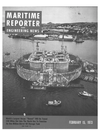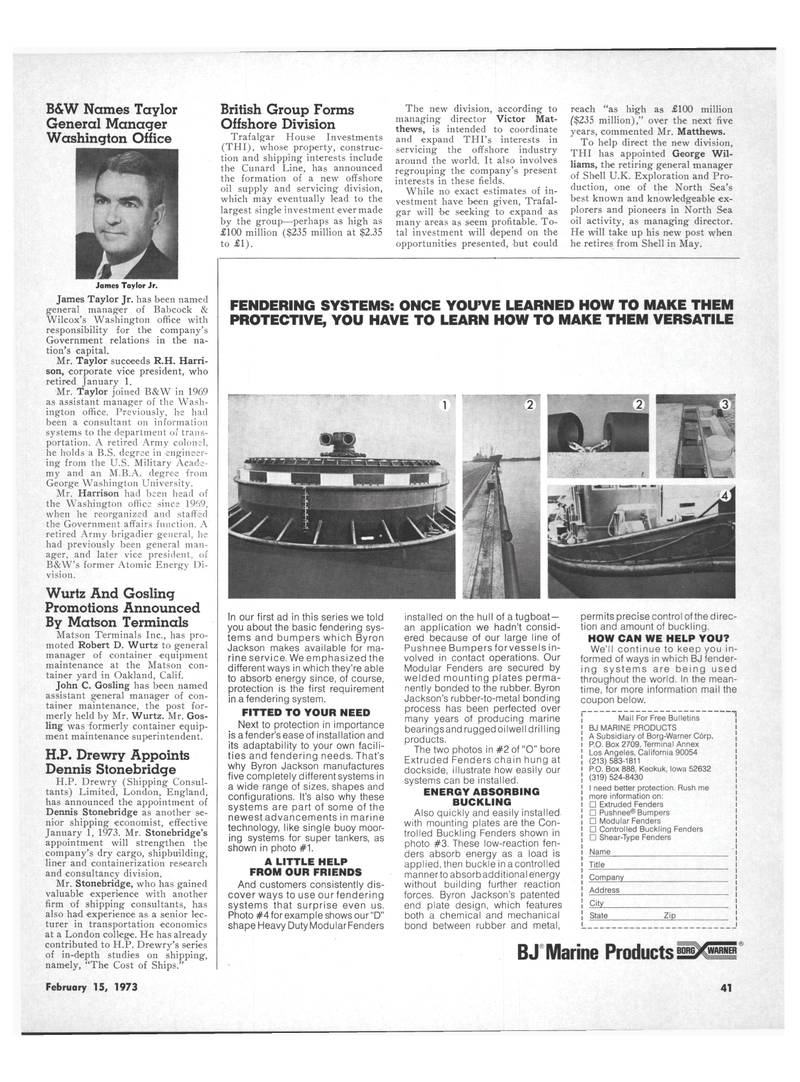
Page 39: of Maritime Reporter Magazine (February 15, 1973)
Read this page in Pdf, Flash or Html5 edition of February 15, 1973 Maritime Reporter Magazine
B&W Names Taylor
General Manager
Washington Office
James Taylor Jr.
James Taylor Jr. has been named general manager of Babcock &
Wilcox's Washington office with responsibility for the company's
Government relations in the na- tion's capital.
Mr. Taylor succeeds R.H. Harri- son, corporate vice president, who retired January 1.
Mr. Taylor joined B&W in 1969 as assistant manager of the Wash- ington office. Previously, be had been a consultant on information systems to the department of trans- portation. A retired Army colonel, he holds a B.S. degree in engineer- ing from the U.S. Military Acade- my and an M.B.A.. degree from
George Washington University.
Mr. Harrison had been head of the Washington office since 1969, when he reorganized and staffed the Government affairs function. A retired Army brigadier general, he had previously been general man- ager, and later vice president, of
B&W's former Atomic Energy Di- vision.
Wurtz And Gosling
Promotions Announced
By Matson Terminals
Matson Terminals Inc., has pro- moted Robert D. Wurtz to general manager of container equipment maintenance at the Matson con- tainer yard in Oakland, Calif.
John C. Gosling has been named assistant general manager of con- tainer maintenance, the post for- merly held by Mr. Wurtz. Mr. Gos- ling was formerly container equip- ment maintenance superintendent.
H.P. Drewry Appoints
Dennis Stonebridge
H.P. Drewry (Shipping Consul- tants) Limited, London, England, has announced the appointment of
Dennis Stonebridge as another se- nior shipping economist, effective
January 1, 1973. Mr. Stonebridge's appointment will strengthen the company's dry cargo, shipbuilding, liner and containerization research and consultancy division.
Mr. Stonebridge, who has gained valuable experience with another firm of shipping consultants, has also had experience as a senior lec- turer in transportation economics at a London college. He has already contributed to H.P. Drewry's series of in-depth studies on shipping, namely, "The Cost of Ships."
February 15, 1973
British Group Forms
Offshore Division
Trafalgar House Investments (THI), whose property, construc- tion and shipping interests include the Cunard Line, has announced the formation of a new offshore oil supply and servicing division, which may eventually lead to the largest single investment evermade by the group—perhaps as high as £100 million ($235 million at $2.35 to £1).
In our first ad in this series we told you about the basic tendering sys- tems and bumpers which Byron
Jackson makes available for ma- rine service. We emphasized the different ways in which they're able to absorb energy since, of course, protection is the first requirement in a tendering system.
FITTED TO YOUR NEED
Next to protection in importance is a fender's ease of installation and its adaptability to your own facili- ties and tendering needs. That's why Byron Jackson manufactures five completely different systems in a wide range of sizes, shapes and configurations. It's also why these systems are part of some of the newest advancements in marine technology, like single buoy moor- ing systems for super tankers, as shown in photo #1.
A LITTLE HELP
FROM OUR FRIENDS
And customers consistently dis- cover ways to use our tendering systems that surprise even us.
Photo #4 for example shows our "D" shape Heavy Duty ModularFenders
The new division, according to managing director Victor Mat- thews, is intended to coordinate and expand THI's interests in servicing the offshore industry around the world. It also involves regrouping the company's present interests in these fields.
While no exact estimates of in- vestment have been given, Trafal- gar will be seeking to expand as many areas as seem profitable. To- tal investment will depend on the opportunities presented, but could installed on the hull of a tugboat— an application we hadn't consid- ered because of our large line of
Push nee Bumpers for vessels in- volved in contact operations. Our
Modular Fenders are secured by welded mounting plates perma- nently bonded to the rubber. Byron
Jackson's rubber-to-metal bonding process has been perfected over many years of producing marine bearings and rugged oilwel I drilling products.
The two photos in #2 of "0" bore
Extruded Fenders chain hung at dockside, illustrate how easily our systems can be installed.
ENERGY ABSORBING
BUCKLING
Also quickly and easily installed, with mounting plates are the Con- trolled Buckling Fenders shown in photo #3. These low-reaction fen- ders absorb energy as a load is applied, then buckle in a controlled manner to absorb additional energy without building further reaction forces. Byron Jackson's patented end plate design, which features both a chemical and mechanical bond between rubber and metal, reach "as high as £100 million ($235 million)," over the next five years, commented Mr. Matthews.
To help direct the new division,
THI has appointed George Wil- liams, the retiring general manager of Shell U.K. Exploration and Pro- duction, one of the North Sea's best known and knowledgeable ex- plorers and pioneers in North Sea oil activity, as managing director.
He will take up his new post when he retires from Shell in May. permits precise control of the direc- tion and amount of buckling.
HOW CAN WE HELP YOU?
We'll continue to keep you in- formed of ways in which BJ fender- ing systems are being used throughout the world. In the mean- time, for more information mail the coupon below.
Mail For Free Bulletins
BJ MARINE PRODUCTS
A Subsidiary of Borg-Warner Corp.
P.O. Box 2709, Terminal Annex
Los Angeles, California 90054 (213) 583-1811
P.O. Box 888, Keokuk, Iowa 52632 (319) 524-8430
I need better protection. Rush me more information on: • Extruded Fenders • Pushnee® Bumpers • Modular Fenders • Controlled Buckling Fenders • Shear-Type Fenders
Name
Title
Company
Address
City
State Zip
B J Marine Products SPSS 41
FENDERING SYSTEMS: ONCE YOU'VE LEARNED HOW TO MAKE THEM
PROTECTIVE, YOU HAVE TO LEARN HOW TO MAKE THEM VERSATILE

 38
38

 40
40
